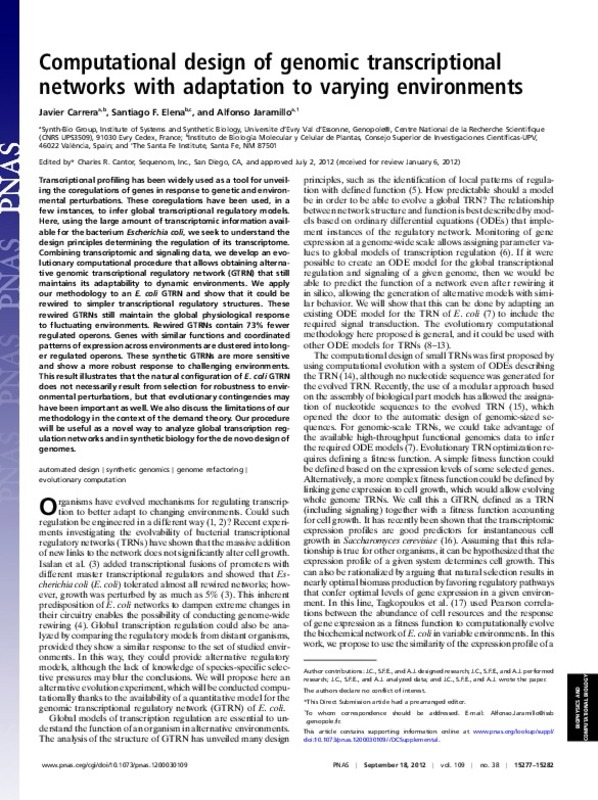JavaScript is disabled for your browser. Some features of this site may not work without it.
Buscar en RiuNet
Listar
Mi cuenta
Estadísticas
Ayuda RiuNet
Admin. UPV
Computational design of genomic transcriptional networks with adaptation to varying environments
Mostrar el registro sencillo del ítem
Ficheros en el ítem
| dc.contributor.author | Carrera Montesinos, Javier
|
es_ES |
| dc.contributor.author | Elena Fito, Santiago Fco
|
es_ES |
| dc.contributor.author | Jaramillo Rosales, Alfonso
|
es_ES |
| dc.date.accessioned | 2017-05-18T08:55:57Z | |
| dc.date.available | 2017-05-18T08:55:57Z | |
| dc.date.issued | 2012-09-18 | |
| dc.identifier.issn | 0027-8424 | |
| dc.identifier.uri | http://hdl.handle.net/10251/81362 | |
| dc.description.abstract | [EN] Transcriptional profiling has been widely used as a tool for unveiling the coregulations of genes in response to genetic and environmental perturbations. These coregulations have been used, in a few instances, to infer global transcriptional regulatory models. Here, using the large amount of transcriptomic information available for the bacterium Escherichia coli, we seek to understand the design principles determining the regulation of its transcriptome. Combining transcriptomic and signaling data, we develop an evolutionary computational procedure that allows obtaining alternative genomic transcriptional regulatory network (GTRN) that still maintains its adaptability to dynamic environments. We apply our methodology to an E. coli GTRN and show that it could be rewired to simpler transcriptional regulatory structures. These rewired GTRNs still maintain the global physiological response to fluctuating environments. Rewired GTRNs contain 73% fewer regulated operons. Genes with similar functions and coordinated patterns of expression across environments are clustered into longer regulated operons. These synthetic GTRNs are more sensitive and show a more robust response to challenging environments. This result illustrates that the natural configuration of E. coli GTRN does not necessarily result from selection for robustness to environmental perturbations, but that evolutionary contingencies may have been important as well. We also discuss the limitations of our methodology in the context of the demand theory. Our procedure will be useful as a novel way to analyze global transcription regulation networks and in synthetic biology for the de novo design of genomes. | es_ES |
| dc.description.sponsorship | This work was supported by FP7-ICT-043338 (Bacterial Computing with Engineered Populations), ATIGE-Genopole, TIN2006-12860 (Ministry of Science and Innovation [MICINN]), and the Fondation pour la Recherche Medicale grants (to A.J.). S. F. E. is supported by grant BFU2009-06993 (MICINN). We thank B. Palsson, T. Conrad, and M. Isalan for providing us with experimental data from their recent publications, J. Forment for help with computer resources; R. Estrela, G. Rodrigo, for discussions; J. Sardanyes, T. Landrain, L. Janniere, I. Junier, M. P. Zwart, and F. Kepes for critical reading of the manuscript; and the comments provided by anonymous reviewers. | en_EN |
| dc.language | Inglés | es_ES |
| dc.publisher | National Academy of Sciences | es_ES |
| dc.relation.ispartof | Proceedings of the National Academy of Sciences | es_ES |
| dc.rights | Reserva de todos los derechos | es_ES |
| dc.subject | Automated design | es_ES |
| dc.subject | Synthetic genomics | es_ES |
| dc.subject | Genome refactoring | es_ES |
| dc.subject | Evolutionary computation | es_ES |
| dc.title | Computational design of genomic transcriptional networks with adaptation to varying environments | es_ES |
| dc.type | Artículo | es_ES |
| dc.identifier.doi | 10.1073/pnas.1200030109 | |
| dc.relation.projectID | info:eu-repo/grantAgreement/MEC//TIN2006-12860/ | es_ES |
| dc.relation.projectID | info:eu-repo/grantAgreement/EC/FP7/043338/EU/ | |
| dc.rights.accessRights | Abierto | es_ES |
| dc.contributor.affiliation | Universitat Politècnica de València. Instituto Universitario Mixto de Biología Molecular y Celular de Plantas - Institut Universitari Mixt de Biologia Molecular i Cel·lular de Plantes | es_ES |
| dc.contributor.affiliation | Universitat Politècnica de València. Instituto de Instrumentación para Imagen Molecular - Institut d'Instrumentació per a Imatge Molecular | es_ES |
| dc.description.bibliographicCitation | Carrera Montesinos, J.; Elena Fito, SF.; Jaramillo Rosales, A. (2012). Computational design of genomic transcriptional networks with adaptation to varying environments. Proceedings of the National Academy of Sciences. 109(38):15277-15282. https://doi.org/10.1073/pnas.1200030109 | es_ES |
| dc.description.accrualMethod | S | es_ES |
| dc.relation.publisherversion | http://doi.org/10.1073/pnas.1200030109 | es_ES |
| dc.description.upvformatpinicio | 15277 | es_ES |
| dc.description.upvformatpfin | 15282 | es_ES |
| dc.type.version | info:eu-repo/semantics/publishedVersion | es_ES |
| dc.description.volume | 109 | es_ES |
| dc.description.issue | 38 | es_ES |
| dc.relation.senia | 232203 | es_ES |
| dc.identifier.pmid | 22927389 | en_EN |
| dc.identifier.pmcid | PMC3458320 | |
| dc.contributor.funder | European Commission | |
| dc.contributor.funder | Ministerio de Educación y Ciencia | es_ES |








